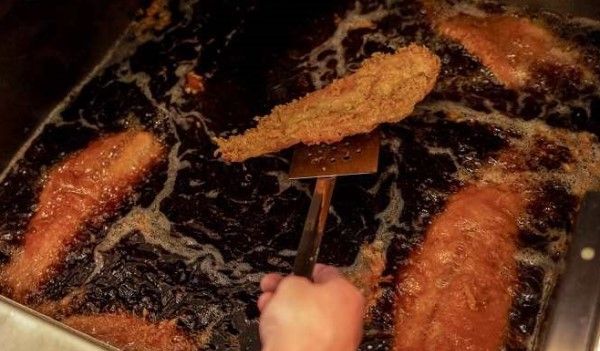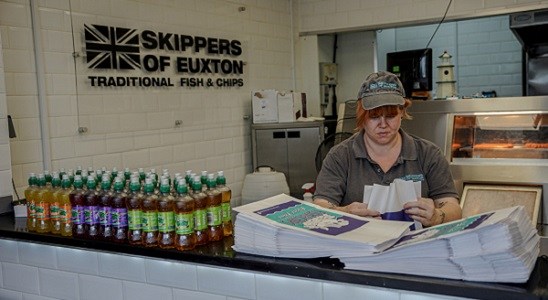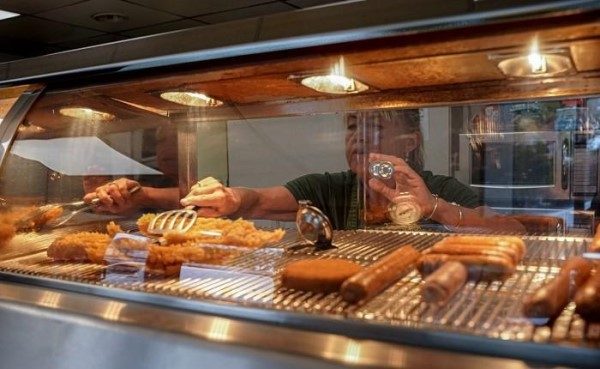
This shuttered chip shop in Preston, England, is just one of many squeezed out of business. MUST CREDIT: Photo for The Washington Post by James Forde.
12:50 JST, July 3, 2022
CHORLEY, England – It is a perilous time for fish and chips, the golden fried food for the masses, celebrated as Britain’s “favourite meal” and “the national dish.”
As it turns out, a lot of that fish comes from Russian trawlers and the sunflower oil from Ukrainian fields.

Fish is fried at Godwin’s Fish and Chips, a longtime “chippy” shop in Preston, England.
With Russia’s war raging in Ukraine, that means skyrocketing prices for hungry Brits. The ingredients for an order of fish and chips – by design cheap and caloric – now cost more than twice as much as at the start of the year.
And so we find ourselves with Andrew Crook, president of the National Federation of Fish Friers, standing outside of a shuttered “chippy” in this small town about 20 miles northwest of Manchester. His organization estimates that a third of the United Kingdom’s 10,500 fish and chip shops will go out of business in the coming year.
“We’ve survived through two world wars, a depression, multiple recessions. We’ve never seen anything like this,” said Crook, who owns a nearby shop, Skippers of Euxton, where he is about to raise prices in the hope of staying afloat.
Your average chip shop has always run on tight margins. But owners say they never imagined they would be victims of a 21st-century globalized commodity economy upended by World War II-style artillery engagements in Europe and then crippled by a naval blockade in the Black Sea.
This is our new world.

Lorraine Agent packs a customer’s order at Skippers of Euxton, another fish and chip shop just outside Preston, England.
***
It’s hard to overstate the centrality of the chippy in British life – the traditional mom-and-pop joint, aromatic with grease, gleaming with stainless steel fryers, where the orders are dosed in salt and vinegar (or gravy or curry), before being tidily wrapped in a piece of paper. Even if many owners these days are recent immigrants, the shops remain one of the most reliable of British institutions.
Fish and chips were “originally the working man’s lunch, and it is the meal a family would eat together on a Friday night, that would fill you up, fill up all your kids, no matter how many kids you had, and the low cost and high calories were always part of that deal,” Crook said.

Nick Andronicou and his wife, Charlotte, have been in the fish and chips business in Chorley, England, for nearly a decade.
Nick Andronicou and his wife have run Charlie’s Chips in Chorley for eight years. Both are from Greece and wanted their daughters to get an English education.
“It’s been a good business, very reliable. Same customers – they come once a week, or three times a week. It is good for the pensioners, good for people on a budget,” said Andronicou, whose shop sells a small order of fish with chips, mushy peas, bread and butter and tea for about $5.50.
He just ordered new menus because he is about to increase prices. But the future looks bleak, in his view. He assumes he will lose even some regulars. “A lot of chip shops will close,” he said.
In some pubs, where fish and chips are also a staple, chefs say the dish is now more expensive to make than a steak filet. The businesses that manufacture fish fingers and fish pies on an industrial scale are feeling the squeeze, too. Schoolchildren will soon see a favorite lunch option disappear.
All sad news, but restaurants and schools can change the protein on their menus. The fish and chips shop cannot, nor can they easily switch the fish they serve. The chippy customer is highly resistant to experimentation; they want the same bland white fish that the shops have served for about 160 years – meaning cod or haddock, few of which are found in British waters.
The chippies have tried to peddle tilapia, skate and hake. They have not won fans.
Originally a food phenomenon of the Victorian era, fish and chips is as basic as can be.
Cod. Potatoes. Oil. Heat.
But the supply chain is highly complex.
Ukraine is the world’s leading supplier of sunflower oil, producing 50% of the global supply. But with its ports now a war zone, blockaded by Russia, the price of its sunflower oil has tripled. Shipping overland – via train and truck – jacks up costs further.
Many chippies have pivoted to palm oil from Asia, only to see prices for that climb similarly. Fearing it would run out of oil as global demand soared this spring, Indonesia briefly blocked palm oil exports. The move sent more shock waves through the commodities market.
There’s one more issue. While fish and chips is traditionally considered a quintessential “British” meal, this is not really true. Most of the whitefish in the market today comes from the fishing fleets of Norway, Iceland and especially Russia.
Cod and haddock are cold-water fish – and with climate change, they have been migrating north, about seven miles a year, to the higher latitudes.
“Our home waters have never produced much in the way of cod and haddock,” the traditional foundation of fish and chips, noted Barrie Deas, chief executive of the National Federation of Fishermen’s Organizations.
Russian trawlers supply half of the whitefish consumed in Britain and between 30% and 60% of the fish for chip shops, depending on the year and price, according to Aoife Martin, operations director for the government monitoring agency Seafish.
To sanction Russia for its invasion of Ukraine, Prime Minister Boris Johnson’s government announced that it would slap a 35% tariff on Russian whitefish. The action was to take effect in March but was delayed. Skeptics assume the government is fearful of a price hike and what it might do to the chippies. Government officials promise the tariff is “imminent.”
British fleets still catch a decent amount of cod these days, though they are hard-pressed by the soaring cost of fuel. Diesel has doubled, in part because of the Ukraine war and energy sanctions against Russia.
Deas says the British fishing sector has hit an economic tipping point, with many vessels idling in port. He pointed to recent reports by his organizations: A vessel in southwest England made a landing of fish worth $13,396, but fuel costs swallowed $12,630. In another case, a landing of $53,560 and a fuel bill of $35,240 plus other expenses left $2,290 for each of the eight crew members.
“This is a tough job,” said Deas, who said British captains have been struggling to find crews willing to risk their lives to go to sea for virtually no money.
Alex Bracewell runs Godwin’s Fish and Chips in nearby Preston. The business has been in the family for four generations. They’re a popular spot, with good parking.
“We’ll make it, I think,” Bracewell said Tuesday. “But the shops just hanging on?”
He shrugged, then darted back to deal with the lunchtime rush.

Louise Whiston prepares an order at Godwin’s Fish and Chips in Preston, England. MUST CREDIT: Photo for The Washington Post by James Forde.
Top Articles in News Services
-

Prudential Life Expected to Face Inspection over Fraud
-

Hong Kong Ex-Publisher Jimmy Lai’s Sentence Raises International Outcry as China Defends It
-

Japan’s Nikkei Stock Average Touches 58,000 as Yen, Jgbs Rally on Election Fallout (UPDATE 1)
-

Trump Names Former Federal Reserve Governor Warsh as the Next Fed Chair, Replacing Powell
-

Suzuki Overtakes Nissan as Japan’s Third‑Largest Automaker in 2025
JN ACCESS RANKING
-

Japan Institute to Use Domestic Commercial Optical Lattice Clock to Set Japan Standard Time
-

Japan PM Takaichi’s Cabinet Resigns en Masse
-

Israeli Ambassador to Japan Speaks about Japan’s Role in the Reconstruction of Gaza
-

Man Infected with Measles May Have Come in Contact with Many People in Tokyo, Went to Store, Restaurant Around When Symptoms Emerged
-

Prudential Life Insurance Plans to Fully Compensate for Damages Caused by Fraudulent Actions Without Waiting for Third-Party Committee Review





















